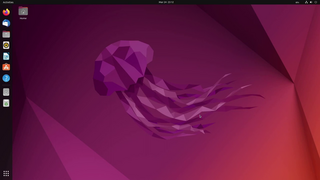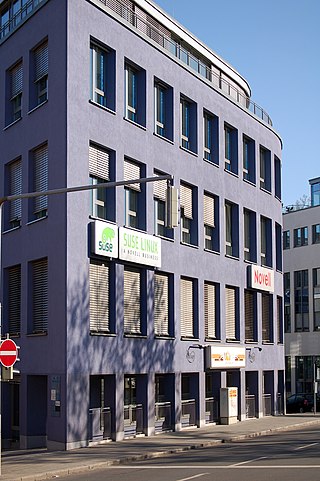
OpenOffice.org (OOo), commonly known as OpenOffice, is a discontinued open-source office suite. Active successor projects include LibreOffice, Apache OpenOffice and Collabora Online.

Bdale Garbee is an American computer specialist who works with Linux, particularly Debian. He is also an amateur radio hobbyist (KB0G), and a member of AMSAT, Tucson Amateur Packet Radio, and the American Radio Relay League. As of 2023 he is the President of Amateur Radio Digital Communications.

Canonical Ltd. is a privately held computer software company based in London, England. It was founded and funded by South African entrepreneur Mark Shuttleworth to market commercial support and related services for Ubuntu and related projects. Canonical employs staff in more than 70 countries and maintains offices in London, Austin, Boston, Shanghai, Beijing, Taipei, Tokyo and the Isle of Man.
The following tables compare general and technical information for a number of HTML editors.

SUSE S.A. is a Luxembourgish multinational open-source software company that develops and sells Linux products to business customers. Founded in 1992, it was the first company to market Linux for enterprise. It is the developer of SUSE Linux Enterprise and the primary sponsor of the community-supported openSUSE Linux distribution project. While the openSUSE "Tumbleweed" variation is an upstream distribution for both the "Leap" variation and SUSE Linux Enterprise distribution, its branded "Leap" variation is part of a direct upgrade path to the enterprise version, which effectively makes openSUSE Leap a non-commercial version of its enterprise product.

LiMux was a project launched by the city of Munich in 2004 in order to replace the software on its desktop computers, migrating from Microsoft Windows to free software based on Linux. By 2012, the city had migrated 12,600 of its 15,500 desktops to LiMux. In November 2017 Munich City Council resolved to reverse the migration and return to Microsoft Windows-based software by 2020. In May 2020, it was reported that the newly elected politicians in Munich, while not going back to the original plan of migrating to LiMux wholesale, will prefer Free Software for future endeavours.
Bruce Byfield is a Canadian journalist who specializes in writing about free and open source software. He has been a contributing editor at Linux.com, and his articles have appeared on the Datamation, LWN, Linux Developer Network, and LinuxPlanet sites. He also writes a monthly blog for the Linux Journal website, which provides introductions to popular free software such as LibreOffice, and Scribus, and a weekly blog for Linux Pro Magazine about free software and the issues surrounding it. In addition to his online publications, he has published in such magazines as Maximum Linux, Ubuntu User and The New Internationalist, and writes a column about the command line for Linux Pro Magazine. His personal blog, Off the Wall, is a collection of short personal essays.

Go-oo is a discontinued free office suite which started as a set of patches for OpenOffice.org, then later became an independent fork of OpenOffice.org with a number of enhancements, sponsored by Novell.
The Free Software Foundation (FSF) is a 501(c)(3) non-profit organization founded by Richard Stallman on October 4, 1985, to support the free software movement, with the organization's preference for software being distributed under copyleft terms, such as with its own GNU General Public License. The FSF was incorporated in Boston, Massachusetts, United States, where it is also based.

According to the Free Software Foundation Latin America, Linux-libre is a modified version of the Linux kernel that contains no binary blobs, obfuscated code, or code released under proprietary licenses. In the Linux kernel, they are mostly used for proprietary firmware images. While generally redistributable, binary blobs do not give the user the freedom to audit, modify, or, consequently, redistribute their modified versions. The GNU Project keeps Linux-libre in synchronization with the mainline Linux kernel.

LibreOffice is a free and open-source office productivity software suite, a project of The Document Foundation (TDF). It was forked in 2010 from OpenOffice.org, an open-sourced version of the earlier StarOffice. It consists of programs for word processing; creating and editing spreadsheets, slideshows, diagrams, and drawings; working with databases; and composing mathematical formulae. It is available in 120 languages. TDF does not provide support for LibreOffice, but enterprise-focused editions are available from companies in the ecosystem.
The Document Foundation (TDF) is a non-profit organization that promotes open-source document handling software. It was created by members of the OpenOffice.org community to manage and develop LibreOffice, a free and open-source office suite, and is legally registered in Germany as a Stiftung. Its goal is to produce a vendor-independent office suite with ODF support in a development environment free from company control.
The following is a comparison of major desktop publishing software.

LibreOffice Writer is the free and open-source word processor and desktop publishing component of the LibreOffice software package and is a fork of OpenOffice.org Writer. Writer is a word processor similar to Microsoft Word and Corel's WordPerfect with many similar features, and file format compatibility.

LibreOffice Calc is the spreadsheet component of the LibreOffice software package.

LibreOffice Base is a free and open-source database development and administration tool for relational database management systems that is part of the LibreOffice office suite. LibreOffice Base was built off of a fork of OpenOffice.org and was first released as version 3.4.0.1 on October 4, 2011.

LibreOfficeDraw is a free and open source vector graphics editor. It is one of the applications included in the LibreOffice office suite, developed by The Document Foundation.

Apache OpenOffice (AOO) is an open-source office productivity software suite. It is one of the successor projects of OpenOffice.org and the designated successor of IBM Lotus Symphony. It was a close cousin of LibreOffice, Collabora Online and NeoOffice in 2014. It contains a word processor (Writer), a spreadsheet (Calc), a presentation application (Impress), a drawing application (Draw), a formula editor (Math), and a database management application (Base).

Björn Michaelsen was the Deputy Chairman at The Document Foundation, the legal entity behind LibreOffice.

Collabora Online is an open source online office suite built on LibreOffice technology, enabling web-based collaborative real-time editing of word processing documents, spreadsheets, presentations, and vector graphics. Optional apps are available for desktops, laptops, tablets, smartphones, and Chromebooks.











